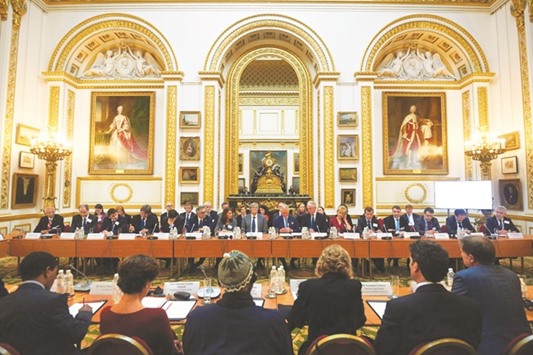The Paris Agreement signed within the United Nations (UN) Framework Convention on Climate Change in December 2015 has entered into force in record time. As of October 11 this year, 76 parties have ratified the agreement, while only 55 parties are required to ratify for the agreement to enter into force.
Another requirement that the 55 parties must account for at least 55% of the total greenhouse gas emissions has also been met, with current numbers at almost 60%.
The implementation of the Paris Agreement will be carried out according to Nationally Determined Contributions (NDCs) that countries submitted prior to the negotiations in Paris.
The Paris Agreement commits countries to keep global warming well below 2 degrees Celsius compared to pre-industrial levels as well as to attempt to limit warming to 1.5 degrees and to ensure net zero emissions in the second half of this century.
The agreement is now a reality and all Arab countries must ratify this to benefit from its mechanisms, funding opportunities, and the global momentum towards fighting climate change.
In addition, the agreement provides new business opportunities in various low carbon and clean technology industries.
The Arab region can play a key role in realising the Paris Agreement with the COP22 to be held in Marrakech, Morocco, next month. Marrakech could be the first positive turning point, globally and regionally, towards the implementation of the Paris agreement with many decisions, policies, and strategies expected to enable the realisation of the agreement’s goals on the ground.
On the one hand, the Arab world faces mounting challenges such as armed conflicts, unemployment, water scarcity and social tensions. On the other, the region has many natural resources (solar energy is a clear example), young populations as well as cheap labour which point to the potential for significant sustainable development in the region.
The total emissions of the Arab world stand at around 4% of the global emissions with the top three emitters being Saudi Arabia (0.8%), the United Arab Emirates (0.53%), and Egypt (0.52%). To date, 18 Arab countries, out of 22, have signed the Paris agreement (Saudi Arabia, Iraq, Comoros and Syria have not signed yet), but only four countries have ratified it (the UAE, Palestine, Morocco and Algeria).
The COP22 in Marrakech is important for the Arab region as it will discuss a number of key issues that are of relevance to the region. Capacity building, for instance, is a major issue for the Arab region.
In fact, the region needs capacity building urgently and, therefore, can work with other developing countries particularly in capacity building for the areas of adaptation finance and also to implement NDCs as well as mitigation initiatives.
The developed countries are to deliver $100bn annually as climate finance by 2020. One of the key announcements at the Marrakech COP22 could be on a road map for this $100bn.
The Arab region is developing ambitious policies and projects that will help in the reduction of greenhouse gases without adversely affecting social development. Thus, funding is a central issue for the region.
In addition, the Arab world should seek technology transfer and finance during the Marrakech climate talks.
Owning environment-friendly, clean, low emission technology in various sectors will smooth the transition towards a green and low carbon economy that attracts new investment and creates green jobs.
In the long run, this would be a better and sustainable option for the region that, at present, mainly depends on fossil fuel revenues.
In fact, the Paris Agreement is not about climate change only; it will change the path of development worldwide. It will affect almost all sectors of the global economy from energy, transportation, and agriculture to lifestyle, actions and choices of people around the world.
Thus, the national policies for various sectors are likely to contribute not only to the United Nations’ sustainable development goal (SDG) 7, – to “take urgent action to combat climate change and its impacts” – but also to realise almost all the 17 SDGs of the Agenda 2030 especially when climate considerations and low carbon plans are integrated into the national planning of countries.
There is no doubt that the COP22 in Marrakech will put the spotlight on the region with regard to how it plans to go for the decarbonisation of its economies and it will allow the region to showcase various green projects, particularly in the field of renewable energy.
The event will play an instrumental role in raising awareness, especially among the youth in the Arab world, about climate change impacts on the region as well as the importance of taking comprehensive and quick actions to fight climate change.
COP22 is a good opportunity for the region and it should make every effort to ensure the meeting’s success as well as benefit from it.
*Dr Mohamed Abdel Raouf is the sustainability research programme manager at the Gulf Research Center.

Ministers and delegates attending a meeting on u201cSustainable landscapesu201d at Lancaster House in London in the run-up to COP22 in Marrakech.
